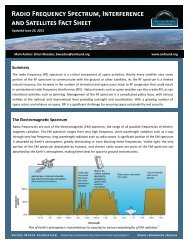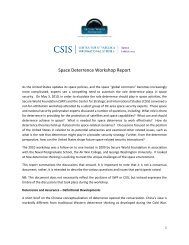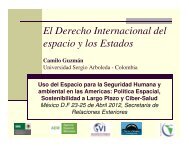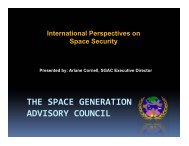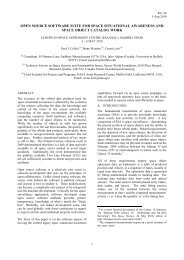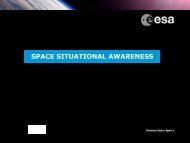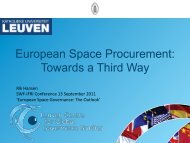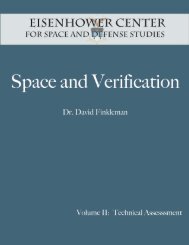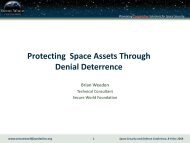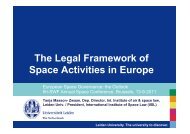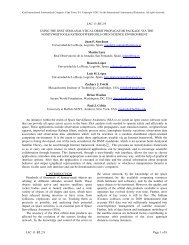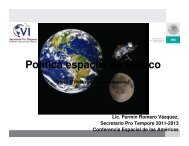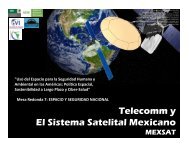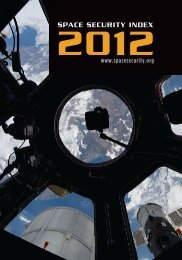Space Security Index
Space Security Index
Space Security Index
Create successful ePaper yourself
Turn your PDF publications into a flip-book with our unique Google optimized e-Paper software.
<strong>Space</strong> <strong>Security</strong> 2011<br />
CHAPTER THREE<br />
56<br />
Laws, Policies, and Doctrines<br />
This chapter assesses trends and developments related to national and international space<br />
laws, multilateral institutions, national space policies, and military space doctrines.<br />
International space law has gradually expanded to include, inter alia, the 1967 Outer <strong>Space</strong><br />
Treaty (OST), the 1968 Astronaut Rescue Agreement, the 1972 Liability Convention, the<br />
1975 Registration Convention, and the 1979 Moon Agreement. These treaties establish the<br />
fundamental right of all states to access space, as well as state responsibility to use space for<br />
peaceful purposes. They also prohibit national appropriation of space and restrict certain<br />
military space activities, such as placing nuclear weapons or weapons of mass destruction<br />
in outer space.<br />
This chapter also assesses trends and developments related to the multilateral institutions<br />
that address matters related to space activities, such as the United Nations Committee on the<br />
peaceful Uses of Outer <strong>Space</strong> (COPUOS), the Conference on Disarmament (CD), and the<br />
UN General Assembly (UNGA). While COPUOS tends to focus on commercial and civil<br />
space issues, the CD primarily addresses military space challenges through its agenda item<br />
on the Prevention of an Arms Race in Outer <strong>Space</strong> (PAROS). The ITU addresses matters<br />
related to the allocation of space resources such as orbital slots and radiofrequencies.<br />
The development of national space policies has been conducive to greater transparency<br />
and predictability of space activities insofar as these policies delineate the principles and<br />
objectives of space actors with respect to the access to and use of space. They provide the<br />
context within which national civil, commercial, and military space actors operate. It is<br />
important to note that, despite the ongoing development of military space applications, for<br />
the most part, states continue to emphasize international cooperation and the peaceful uses<br />
of space in their national space policies.<br />
This chapter also examines the relationship between national space policies and military<br />
space programs. Reflecting the fact that space is increasingly being used to support military<br />
operations, some space actors also have designated national military space doctrines that<br />
support the development of military space applications such as navigation, communications,<br />
intelligence, surveillance, reconnaissance, and meteorological capabilities.<br />
<strong>Space</strong> <strong>Security</strong> Impact<br />
The existence of international policy instruments to regulate space activities has a direct<br />
impact on space security since they establish key parameters for space activities such as<br />
the right of all countries to access space, prohibitions against the national appropriation<br />
of space and the placement of certain weapons in space, and the obligation to ensure that<br />
space is used for peaceful purposes. International space law can improve space security by<br />
restricting activities that infringe upon the ability of actors to access and use space safely<br />
and sustainably, or that result in space-based threats to national assets in space or on Earth.<br />
When followed, space policy helps promote the predictability and transparency of space<br />
activities among different stakeholders and helps to overcome problems of collective<br />
security. Current national legislation and international space law also play an important<br />
role in establishing the building blocks for the development of a more robust, up-to-date<br />
regulatory regime on space activities that fills the voids and addresses the shortcomings of<br />
the existing space security normative architecture.<br />
Multilateral institutions like the CD and COPUOS play an essential role in space security<br />
by providing a venue to address common challenges related to space activities. Member



